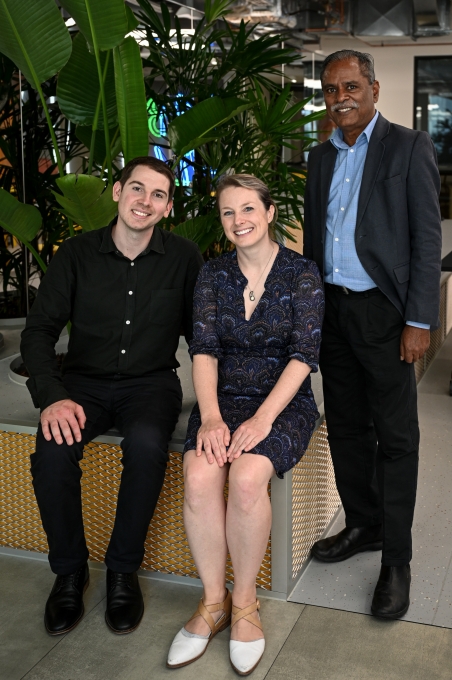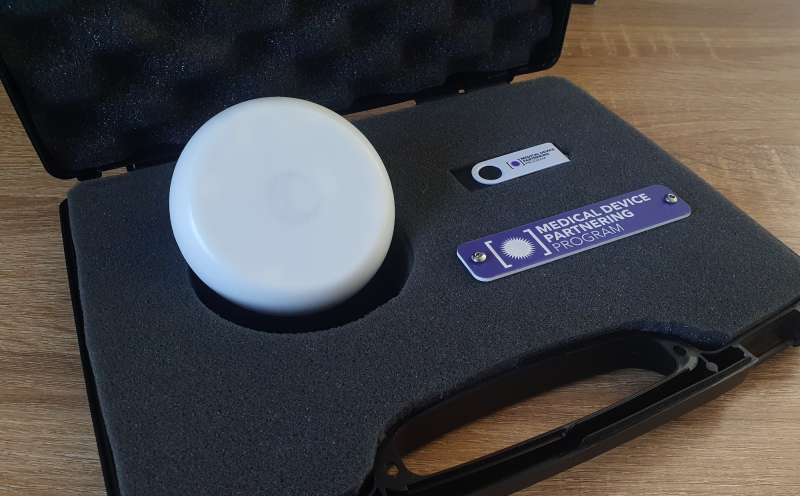On a mission to enhance the care of pregnant mothers and their unborn babies, Melbourne based start-up Kali Healthcare have secured significant funding to help them realise their revolutionary next generation wearable pregnancy monitoring device.
Recognising an opportunity to advance perinatal care, obstetrician Associate Prof Fiona Brownfoot together with engineers, Dr Emerson Keenan and Prof Marimuthu Palaniswami (pictured right) have adapted electrical sensor technology - commonly used for measuring cardiac function in adults - to create a simple, accurate and wearable device which can easily pick up and monitor a baby’s heart rate in utero.
The trio approached the Medical Device Partnering Program (MDPP) based at Flinders University’s Tonsley Innovation District for help in developing their proof-of-concept technology into a user-friendly prototype.
Providing 250 hours of medical device and bioengineering expertise, the team at MDPP accelerated Kali’s product development and connected them with a valuable startup ecosystem including ISO13485-accredited development partners, expertise at the Australian National Fabrication Facility and links to potential funding opportunities.
“We are so happy and thankful for the support we’ve received from the MDPP team,” said Dr Emerson Keenan, Kali Healthcare’s CEO. “From technical aspects right through to commercialisation advice, the MDPP’s contributions to our fetal monitoring device have been extremely helpful and we now have a beautiful prototype to show to our stakeholders.”
Shortly after completing the MDPP program, Kali's journey to secure capital gained considerable momentum with a pre-seed investment of $500,000 from University of Melbourne followed by a commitment by LaunchVic's Alice Anderson Fund and a group of private investors, which elevated the total funding for the round to $1 million.
Overcoming the limitations of conventional cardiotocography (CTG), Kali Healthcare's fetal monitoring device accurately captures the baby's heart rate while also providing remote monitoring functionalities. This empowers patients to move about freely and, for those residing in rural or remote regions, enables them to return home while receiving high-quality supervised care with the information transmitted remotely to their healthcare provider.
Professor Karen Reynolds, the Director of MDPP, is proud of her team's contribution to the emerging field of fetal electrocardiography (fECG) and their assistance to Kali Healthcare in creating their groundbreaking monitoring device.
"MDPP's extensive range of expertise ensures that visionaries like Kali Healthcare receive the utmost support in advancing their medical technology," said Prof Reynolds. "Their fetal monitoring device addresses a crucial clinical need by directly advancing perinatal care. This innovation has the potential to reshape the global medical device market, while also championing equitable healthcare for expectant mothers and alleviating strain on healthcare systems around the world."
Supporting the development of novel, high-tech medical devices, the MDPP located at Flinders University facilitates collaboration between researchers, industry, end-users and government, providing innovators with a solid platform to advance their new product’s potential in a competitive medical devices market.
For more information on how the MDPP can support your next project or to submit your innovation to the MDPP please visit www.mddp.org.au
